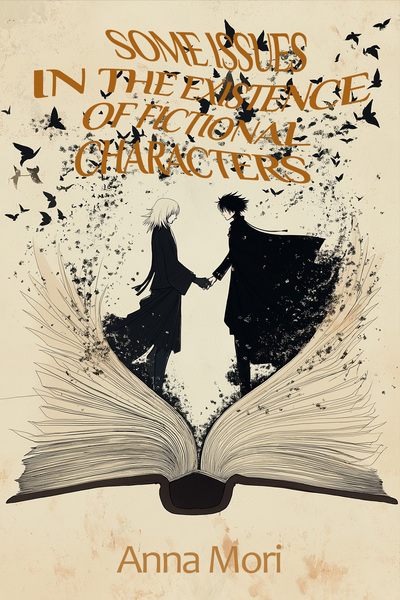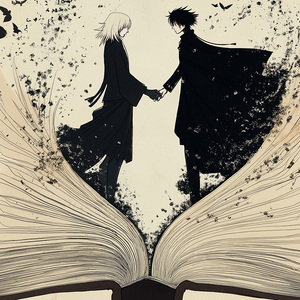PLAYER: Events must play themselves out to aesthetic, moral and logical conclusion.
GUIL: And what's that, in this case?
PLAYER: It never varies — we aim at the point where everyone who is marked for death dies.
— Tom Stoppard, Rosencrantz and Guildenstern Are Dead
L snatched up the pages in an instant — Makishima, at that moment, was too busy spitting out his own blood.
Unlike Svartulf the Cruel, L had no taste for threats or grand speeches. So he didn’t say, "You know what’s about to happen?" or "I tried to do this the easy way." Or even, "You absolute bastard."
He just got to his feet and strode toward the shelf where, as Makishima well remembered, lay a very important book bound in dark leather.
"W-wait—" Makishima choked, panic creeping into his voice. "If you send me back to Psycho-Pass right now, you’ll be alone again. No one will be there to help you get out."
"As if you were ever much help."
"I could have been — if we’d actually worked together! This whole mess happened because we didn’t trust each other. Use your head, detective. If you’d told me everything you knew about Alvstein, I would’ve taken care of the Dark Lord in the blink of an eye!"
"And after everything you’ve done, how exactly was I supposed to trust you?" L countered, not unreasonably.
"For the record, I did everything right! I killed the Dark Lord! I saved you! Do you think it was easy for me, either? I could have just — just run an experiment. See what happens if you die in someone else’s story."
"That would’ve been exactly the kind of thing a bastard like you’d do," L muttered.
"But I didn’t!" Makishima announced triumphantly, still trying (and failing) to lick the blood off his upper lip.
L shook his head, as if baffled that the earth still deigned to carry such an abomination in human form.
"I won’t send you back to Psycho-Pass. Not yet," he finally declared. "Because I might still have some use for you. And because I’m not as much of an asshole as you are. But I am pissed off. I want to find a story where I can get my revenge. A fair revenge."
"You’re seriously thinking about jumping into another book? What, did those three months in a dungeon knock the last bit of sense out of you?" Makishima gawked.
"It was... interesting, in its own way. Or it would’ve been, if not for a certain someone getting me thrown into a dungeon."
L walked past the shelves, eventually selecting a book of considerable weight and gravitas. The cover depicted samurai.
"This one. Something historical, something about war. No elves, no enchanted stones. Just what I need."
Makishima clutched his head.
"You idiot! That’s not just some war novel — it’s a bloody samurai epic. Do you know how those end? With everyonedying!"
"Even if that’s the case, there’s a fifty-percent chance that if we die there, we won’t actually die — we’ll just return here," L said, in what he probably thought was a reassuring tone.
"And what, exactly, makes you think that?" Makishima asked, attempting to stand up (and failing).
L let out a long-suffering sigh.
"Sometimes I think you only pretend to be intelligent. Fifty-fifty chance: either yes, or no."
And with that, he slid the pages into the book.
…This tale recounts a bloody war, waged by two noblemen lost to their own cruelty and pride. Let their fates serve as a lesson to those who come after!
Nothing remains of them now but a handful of dust, scattered on the wind. Nothing remains of their once-mighty armies, for there is no permanence in this fleeting world — decay comes for all, whether humble beggar or mighty ruler alike.
This story begins with the death of Emperor Akihiko.
He had been no masterful ruler. But in life, he was known as a great poet, a lover of beauty, a connoisseur of painting and music. He devoted himself to spiritual pursuits, entrusting the matters of state entirely to his ministers — and to his younger brother.
That brother, Akimitsu, cared deeply for the people and the fate of the land. He was so kind at heart, so beloved by his subjects, that even the most revered emperors of antiquity could scarcely have surpassed him. His mind was as keen as a sword’s edge, fit to bear the burden of an imperial crown—
And for a long time now, in secret, he had prayed that it would be his.
The unfortunate Emperor Akihiko had not yet reached his thirtieth year when he passed away. In his final years, he suffered from a mysterious ailment, the nature of which the court physicians could not comprehend. As time went on, his condition worsened, and, seeing little hope for recovery, he named his brother Akimitsu as his successor, for the emperor had no sons to lay claim to the throne. And so, on the twenty-second day of the fourth month in the tenth year of Ten’an, the breath of Emperor Akihiko ceased forever—for every life must, in the end, reach its limit, and no man may taste the elixir of eternal youth and immortality.
The throne was to pass to his brother Akimitsu. Yet the court was thrown into turmoil when Empress Ageha, daughter of Lord Yoshifusa Morinaga, who at the time served as the Grand Minister, announced that she was with child. Once her condition was confirmed beyond doubt, Lady Ageha declared with absolute conviction that the throne should rightfully belong to her unborn heir. All the high-ranking priests, renowned for the power of their prayers, were urgently summoned and commanded to beseech the Buddhas and Bodhisattvas that the child in Lady Ageha’s womb be not a daughter, but a prince. The Morinaga family rejoiced as if the boy had already been born.
It must be said that, in life, there had been little warmth between the emperor and Empress Ageha. Though they had been wed for more than five years, the gods had yet to bless them with children. Both Akihiko and, after him, his brother Akimitsu bore no great affection for the Morinaga clan, resenting their constant interference in court affairs. Yet the Morinaga were a family of immense wealth and influence, their noble lineage intertwined with the governance of the realm for generations. The current head of the house, Lord Yoshifusa, ruled the land with an iron grip, exiling and executing those who opposed him without fear — even of the emperor himself.
All the Morinaga vassals swore fealty to Empress Ageha and deemed her future son worthy of the throne. Many other noble families followed suit, for none wished to stand against the Morinaga, least of all against the formidable Minister Yoshifusa and Lady Ageha’s cousin, the nobleman Makishima Shougo. At the time, Makishima held the position of Minister of War. Since childhood, he had been devoted to Lady Ageha, cherishing her as one might a beloved younger sister, and he was the first to pledge his unwavering loyalty to both her and her son-to-be.
Yet Prince Akimitsu, too, was indisputably worthy of the throne — he was a pure-blooded descendant of the great Sun Goddess, and, moreover, had been entrusted with the imperial seat by the will of the late sovereign, whose soul had been taken to the heavens far too soon. Akimitsu commanded the loyalty of many powerful vassals who could support his claim and aid him in ruling the empire with wisdom. His most devoted ally among them was his sworn brother, the young yet already renowned nobleman Kuro Ryuzaki of the Raven’s Rest estate, a man whose brilliant intellect had won him fame throughout the land. Recently appointed as the head of the Bureau of Investigations, Ryuzaki was a man of keen insight and unfailing resolve.
Thus, neither Akimitsu nor the Morinaga family could be easily denied in their ambitions. The court was paralyzed with indecision, uncertain where their allegiance should lie. "A difficult choice indeed," the courtiers whispered among themselves.
Following the emperor’s passing, the nobles convened for council. It was then that Ryuzaki, as head of the Bureau of Investigations, declared his intention to examine the circumstances of the late emperor’s death. He summoned from the Empire of Song the most esteemed physician of the time. After questioning the court attendants about Akihiko’s symptoms — chronic fatigue, severe headaches, restless sleep, irrational fears, and waking hallucinations — the physician made his pronouncement: these signs were consistent with chronic mercury poisoning, the result of prolonged exposure to minute doses over several years.
"I suspected as much," Kuro Ryuzaki said grimly.
"What do you mean?" the courtiers asked in astonishment.
"I have long believed that the emperor’s illness was unnatural in origin," he replied.
And though Ryuzaki did not speak the accusation aloud, all in attendance understood his meaning. He was pointing, unmistakably, toward the Morinaga clan.
Minister Yoshifusa Morinaga and his nephew Makishima Shougo wasted no time in accusing Prince Akimitsu of murdering the emperor. At this, Ryuzaki’s anger flared, his voice ringing with fury:
"Do not dare to slander my lord and friend, lest your tongues wither in your mouths. Why would Prince Akimitsu poison his own brother when the emperor had already entrusted him with the reins of power in life and, on his deathbed, willingly bequeathed the throne to him?
"If you have something to say, speak plainly!" Yoshifusa’s voice was cold as steel.
"Then I shall. I believe it was your family that fed poison to the late Emperor Akihiko over the years!
"How dare you defame the mother’s kin of the imperial heir!" Makishima seethed with outrage.
"Your claim to the throne is illegitimate," Kuro Ryuzaki declared coolly. "First, because the unborn child may yet be a girl, despite all your prayers. And second, because in the emperor’s final months, he was so frail that it is doubtful he could have sired an heir at all."
"What is he implying? Such insolence!" Some courtiers gasped in shock, while others exchanged uneasy glances, murmuring among themselves: "Could it be true?"
Then Makishima Shougo, aflame with indignation, turned to his uncle. This insult cannot go unanswered!" he insisted. Taking his nephew’s counsel to heart, Yoshifusa began mustering his forces, determined to secure the throne for his daughter and grandchild. Prince Akimitsu, too, gathered his allies. Thus, the dispute over succession escalated into war. For though it is said that two suns cannot shine in the sky, nor can two emperors rule one land, the empire now had two claimants: the emperor’s brother and the unborn child of Lady Ageha.
Most noble families in the land were bound to either the imperial house or the Morinaga clan by vows of fealty or ties of blood, and so they were compelled to take sides. Some, though sworn to neither house, saw opportunity in the coming war and chose to enter the fray. Almost no one remained neutral.
On the fifteenth day of the fifth month — O, ill-fated summer of an ill-fated year! — two armies marched toward each other from the eastern and western quarters of the capital. At the head of the Morinaga forces stood Lord Yoshifusa and his nephew Makishima Shougo. Prince Akimitsu’s army, meanwhile, was commanded by famed strategists, and at his right hand was his steadfast friend Ryudzaki, renowned for his cunning.
The two forces — Morinaga and Akimitsu — faced each other across the river that split the capital into its eastern and western halves. Not even a full moon had passed since Emperor Akihiko’s death, and now the people of one city prepared to slaughter one another like bitter enemies.
It is said that in those dark days, Prince Akimitsu, shaken by the sight before him, cried out: "Though our cause is just, my heart is heavy — I fear for the capital, I fear for the realm!" And his words, as history would show, proved all too prophetic.
At dawn the next day, in the Hour of the Tiger, the first arrows took flight. Morinaga’s warriors forded the river and, with fierce cries, stormed Prince Akimitsu’s camp. Battle was joined, raging on until the sun once more sank below the horizon.
The same repeated itself the following day. The fighting swayed back and forth, neither side yielding, nor any end in sight. The capital became a perilous place. Those who could flee did so— officials and courtiers among the first to depart. Those without the means to leave sent their loved ones away, uncertain if they would ever see them again, hastily gathering what treasures and belongings they could carry.
Among the departing was Lady Ageha, heavy with child. Her father, Yoshifusa, had resolved to send her far from the bloodstained capital to his native province of Yoshino — a distant northern land she knew only from old tales. Weeping, she composed a poem and inscribed it upon the pillars of the palace, unsure if she would ever return:
O land of my birth,
Would that you had never been!
Then these sleeves, heavy with farewell’s sorrow,
Would not be wet with tears.
As her carriage bore her away, she turned again and again, casting sorrowful glances at the familiar landscapes she had known all her life — the rivers and gardens, the streets and palaces where she had spent so many years. There, in the distance, loomed the Southern Mountain, with the dark rooftops of the Temple of the Deer Garden nestled at its base. There stood the grand estates of her noble kin, and beyond them, the palace of the late Emperor Akihiko. There, the pavilion where one could gaze upon the cherry blossoms in spring… There, the little teahouse where she and her ladies-in-waiting would gather to tell ghost stories or play at poetry-shell games… And there, the Manor by the Pond, where she and her brother Shougo would marvel at the crimson autumn leaves year after year. How many cherished memories she had in this city — how could she have ever imagined she would leave it behind?
Alas, though Yoshifusa and Makishima had sent a great escort to guard Lady Ageha on her journey, she never reached the distant province of Yoshino. It was only much later that her father and cousin would learn of her fate. Her heart had not deceived her — she had left the capital to her own misfortune.
Meanwhile, both warring factions sought to summon every soldier they could from the outer provinces. Morinaga and Makishima gathered 160,000 men, while Akimitsu and Ryuzaki mustered around 120,000.











Comments (0)
See all